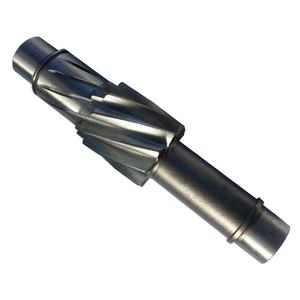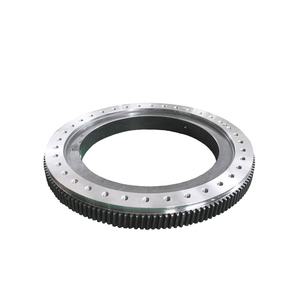PRODUCT PARAMETERS
Description
Overview of Small Modulus Gears M0.5 M1 M2 M3 M4 Gear Hobs
Gears are mechanical elements that are typically used to transmit rotational motion and force. They work by meshing teeth with each other to change speed, direction of torque, or to transfer power between multiple shafts. Gears are an integral part of mechanical engineering and are widely used in a variety of mechanical devices.
Advantages and features of Small Modulus Gears M0.5 M1 M2 M3 M4 Gear Hobs
Efficient transmission: Gears are capable of directly converting power with high efficiency and low energy loss.
Precise ratios: the desired ratio of speed and torque can be obtained by selecting gears of different sizes.
Compact: Small Modulus Gears M0.5 M1 M2 M3 M4 Gear Hobssystems take up less space than other forms of power transmission.
High durability: well-designed gears can operate stably for long periods of time in harsh environments.
Low noise and vibration: Modern Small Modulus Gears M0.5 M1 M2 M3 M4 Gear Hobsmanufacturing technology ensures smooth operation and reduces noise and vibration.
Various types: Spur, helical, and bevel gears are available depending on the application scenario.

(Small Modulus Gears M0.5 M1 M2 M3 M4 Gear Hobs)
Specifications of Small Modulus Gears M0.5 M1 M2 M3 M4 Gear Hobs
Small modulus gears, including M0.5, M1, M2, M3, and M4 gear hobs, are precision cutting tools designed for manufacturing small-sized gears with high accuracy and efficiency. These gear hobs are widely used in industries such as automotive, electronics, robotics, and precision engineering, where compact and finely detailed gears are essential. The small modulus range, particularly M0.5 to M4, caters to the production of miniature gears with tight tolerances and smooth tooth profiles.
The gear hobs are crafted from high-speed steel (HSS) or carbide materials, ensuring durability and resistance to wear during high-speed cutting operations. They are engineered to produce gears with precise tooth geometry, ensuring optimal meshing and reduced noise during operation. The hobs are available in single-thread and multi-thread configurations, allowing for flexibility in production speed and gear quality. Single-thread hobs are ideal for high-precision applications, while multi-thread hobs increase productivity for larger batch sizes.
The cutting edges of these gear hobs are precision-ground to achieve sharpness and consistency, enabling clean and accurate cuts. The hobs are designed with a relief angle to minimize friction and heat generation during the cutting process, extending tool life and maintaining dimensional accuracy. Additionally, the hobs are coated with advanced surface treatments such as TiN (Titanium Nitride) or TiAlN (Titanium Aluminum Nitride) to enhance hardness, reduce wear, and improve performance in demanding applications.
Small modulus gear hobs are compatible with a wide range of gear hobbing machines, making them versatile tools for various manufacturing setups. They are suitable for cutting spur gears, helical gears, and worm gears, offering flexibility in gear design and application. The hobs are available in standard and custom configurations to meet specific gear requirements, ensuring compatibility with unique gear profiles and materials.
In summary, small modulus gear hobs M0.5 to M4 are essential tools for producing high-quality, miniature gears with exceptional precision and efficiency. Their robust construction, advanced coatings, and versatile design make them indispensable in industries requiring compact, reliable, and high-performance gear components.

(Small Modulus Gears M0.5 M1 M2 M3 M4 Gear Hobs)
Applications of Small Modulus Gears M0.5 M1 M2 M3 M4 Gear Hobs
Campony Introduction
Established in 2002, Shift Gear Machinery Co.,ltd. focus on metal research and mining machinery spare parts. 2 factories over an area of 13,300 square meters, based on 100+ sets of equipment, our production capacity reaches 12000 Tons/Year. has passed ISO 9001 quality managment system certification in 2008.
Our mainly products are dragline excavator spare parts,rotary kiln spare parts, large modulus gear (gear shaft), gearbox ect. 40+ patents with over 45 years experience to help focus on improve the service life of spare parts. We belive that more than 80% reason of mechanical parts’ working life depends on hot processing (steel making/forging/casting/welding/heat treatment). Eight material engineers will control the quality from the original resource.
If you are interested, please feel free to contact us.
Payment
L/C, T/T, Western Union, Paypal, Credit Card etc.
Shipment
By sea, by air, by express, as customers request.
5 FAQs of Small Modulus Gears M0.5 M1 M2 M3 M4 Gear Hobs
Small modulus gears, such as those with M0.5, M1, M2, M3, and M4 specifications, are widely used in precision machinery, robotics, and small-scale mechanical systems. Gear hobs are essential tools for manufacturing these gears, and understanding their functionality and applications is crucial. Here are five frequently asked questions about small modulus gear hobs:
1. **What are small modulus gears, and where are they used?**
Small modulus gears are gears with fine tooth profiles, typically used in applications requiring high precision and compact design. They are commonly found in watches, medical devices, robotics, and small machinery where space is limited, and smooth, accurate motion is essential.
2. **What is a gear hob, and how does it work?**
A gear hob is a cutting tool used to create gear teeth by progressively removing material from a workpiece. It features helical cutting teeth that match the gear’s profile. As the hob rotates and moves along the workpiece, it generates the precise tooth shape required for the gear.
3. **Why are gear hobs preferred for small modulus gears?**
Gear hobs are ideal for small modulus gears because they offer high precision, repeatability, and efficiency. They can produce complex tooth profiles with tight tolerances, making them suitable for manufacturing small, intricate gears used in precision applications.
4. **What materials are gear hobs made from?**
Gear hobs are typically made from high-speed steel (HSS) or carbide. HSS hobs are cost-effective and suitable for general-purpose use, while carbide hobs are more durable and ideal for high-volume production or cutting harder materials.
5. **How do I choose the right gear hob for my application?**
Selecting the right gear hob depends on factors such as the gear’s modulus, material, and required precision. For small modulus gears, ensure the hob matches the gear’s specifications (e.g., M0.5, M1, etc.) and is made from a material suitable for the workpiece. Additionally, consider the hob’s coating, such as TiN or TiCN, to enhance durability and performance.
Small modulus gear hobs are indispensable tools for creating precise, high-quality gears. By understanding their functionality and selecting the right hob for your needs, you can ensure efficient and accurate gear production for your applications.

(Small Modulus Gears M0.5 M1 M2 M3 M4 Gear Hobs)
REQUEST A QUOTE
RELATED PRODUCTS
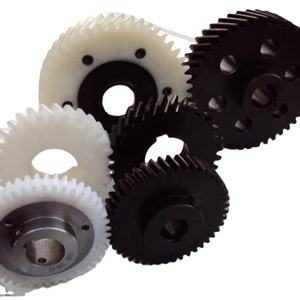
TILI New Type Mini Excavator Track Drive Motor Hydraulic Motor With Worm Drive Gearbox Patgent Gearbox For Concrete Mixer
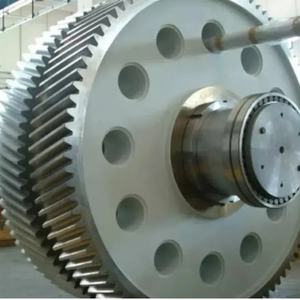
High Precision Gear Planetary Reducer Gearbox For PTO Log Saw
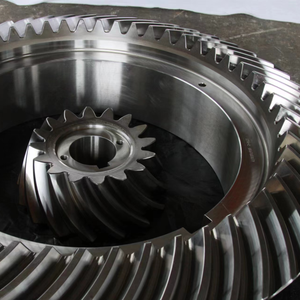
China Hot Powder Metallurgy Motor Gear Stainless Steel Gear Parts Powder Metallurgy Gear
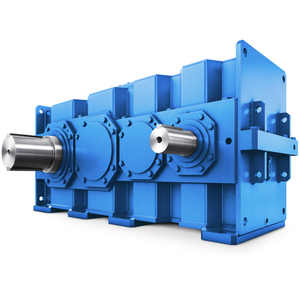
Custom Brass Gear Watch Dial Cnc Machining Kitchen Part
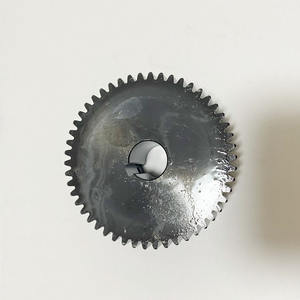
steering gear rudder stock wrench Steering gear internal ball joint extractor remover Screw disassembly and assembly t
